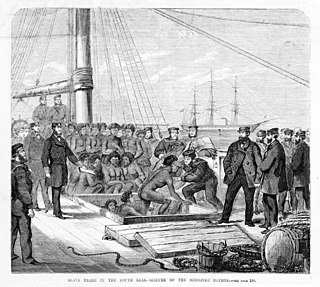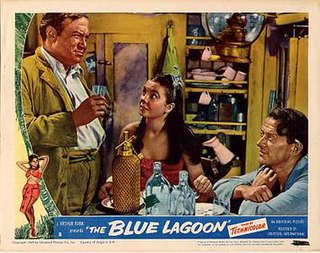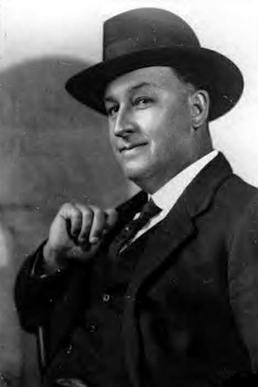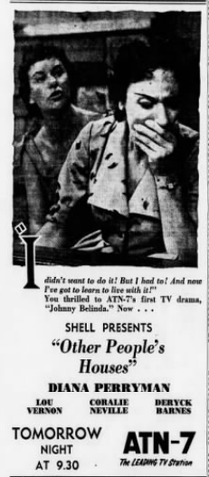
Frederick George Peter Ingle Finch was an English-Australian actor of theatre, film and radio.

Sir Charles Edward Kingsford Smith, nicknamed Smithy, was an Australian aviation pioneer. He piloted the first transpacific flight and the first flight between Australia and New Zealand.

Blackbirding is the coercion and/or deception of people or kidnapping to work as slaves or poorly paid labourers in countries distant from their native land. The practice took place on a large scale with the taking of people indigenous to the numerous islands in the Pacific Ocean during the 19th and 20th centuries. These blackbirded people were called Kanakas or South Sea Islanders. They were taken from places such as Papua New Guinea, the Solomon Islands, Vanuatu, Niue, Easter Island, the Gilbert Islands, Tuvalu, Fiji, and the islands of the Bismarck Archipelago amongst others.

The Blue Lagoon is a 1949 British coming-of-age romance and adventure film directed and co-produced by Frank Launder and starring Jean Simmons and Donald Houston. The screenplay was adapted by John Baines, Michael Hogan, and Frank Launder from the 1908 novel The Blue Lagoon by Henry De Vere Stacpoole. The original music score was composed by Clifton Parker and the cinematography was by Geoffrey Unsworth.
Autumn Affair is an Australian television series made by and aired by Network Seven station ATN-7, and also shown in Melbourne on Nine Network station GTV-9. Television in Australia had only been broadcasting since 1956 and Seven was the first commercial station to make drama a priority.

In the Wake of the Bounty (1933) is an Australian film directed by Charles Chauvel about the 1789 Mutiny on the Bounty. It is notable as the screen debut of Errol Flynn, playing Fletcher Christian. The film preceded MGM's more famous Mutiny on the Bounty, starring Charles Laughton and Clark Gable, by two years.
Graham Hunt Davis is a Walkley Award and Logie Award winning Fijian-born Australian journalist. He hosts a weekly Australian television program, The Great Divide on the Southern Cross Austereo TV Network, and is a consultant to the Washington-based global communications company Qorvis on its Fiji account.
Densey Clyne was an Australian naturalist, photographer, writer, and documentarian. She is especially well known for her studies of spiders and insects. Clyne worked as a researcher, writer, narrator and/or adviser on a number of productions in partnership with cinematographer Jim Frazier.

Warwick Thornton is an Australian film director, screenwriter, and cinematographer. His debut feature film Samson and Delilah won the Caméra d'Or at the 2009 Cannes Film Festival and the award for Best Film at the Asia Pacific Screen Awards. He also won the Asia Pacific Screen Award for Best Film in 2017 for Sweet Country.

The Siege of Pinchgut is a 1959 British thriller filmed on location in Sydney, Australia, and directed by Harry Watt. It was the last film produced by Ealing Studios, and was entered into the 9th Berlin International Film Festival where it was nominated for the Golden Bear Award.

Raymond Longford was a prolific Australian film director, writer, producer, and actor during the silent era. Longford was a major director of the silent film era of the Australian cinema. He formed a production team with Lottie Lyell. His contributions to Australian cinema with his ongoing collaborations with Lyell, including The Sentimental Bloke (1919) and The Blue Mountains Mystery (1921), prompted the Australian Film Institute's AFI Raymond Longford Award, inaugurated in 1968, to be named in his honour.
Ruth Cullen is an Australian-based documentary film
South West Pacific is a 1943 propaganda short Australian film directed by Ken G. Hall which focuses on Australia as the main Allied base in the South West Pacific area. Actors depict a cross section of Australians involved in the war effort.

Shell Presents was an early attempt at Australian television drama, being an umbrella title for several different productions. It debuted on 4 April 1959, and aired on ATN-7 and GTV-9, who split production of plays for the series between them. It was an anthology series, each program being a self-contained play for television. The series won a Logie award in 1960 for TV Highlight of 1959. As the title suggests, it was sponsored by Shell. It was described as "a very big deal for the station: major institutional sponsorship from international companies for locally produced drama." It would be followed by The General Motors Hour.

Todd Sampson is a Canadian-born Australian award-winning documentary-maker and television presenter. Prior to his public career, Sampson worked as an advertising executive and he currently sits on the Qantas board. He is best known for being a regular panellist on marketing discussion program Gruen, and has also been a guest host on The Project. Sampson has also created and presented several science documentary series.

"They Were Big, They Were Blue, They Were Beautiful" is an Australian television movie, or rather a live television play, which aired live on 27 June 1959 in Sydney, and on 8 August 1959 in Melbourne. It aired as part of Shell Presents, a monthly presentation of standalone productions which aired from 1959 to 1960 on ATN-7 in Sydney and GTV-9 in Melbourne.

"The Big Day" is an Australian television film, or rather a live television play, which aired in 1959. The fifth episode of the Shell Presents presentations of standalone television dramas, it originally aired 11 July 1959 on Melbourne station GTV-9, a video-tape was made of the broadcast and shown on Sydney station ATN-7 on 25 July 1959.

"Other People's Houses" is the second episode of the 1959 Australian TV drama anthology Shell Presents. It was based on a play by Tad Mosel and starred Diana Perryman and was directed by David Cahill. It aired on 2 May 1959 in Sydney and on 3 October 1959 in Melbourne.

"Thunder of Silence" is an episode of the 1959 Australian TV drama anthology Shell Presents, and the fourth made in Sydney. It was based on an American play by Stewart Stern which had been produced in the U.S. with Paul Newman and Inger Stevens. It aired live on 22 August 1959 in Sydney with a recorded version airing on 28 November 1959 in Melbourne.

Lasarus Ratuere is an Australian actor. He is known for his portrayal of Ishikawa, a member of Section 9, in the DreamWorks and Paramount Pictures feature film adaptation Ghost in the Shell.














